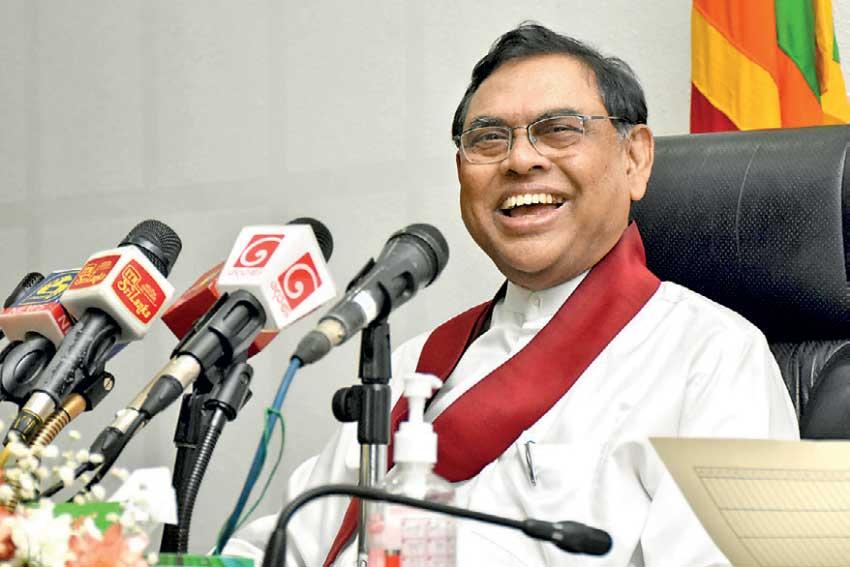04 Jan 2022 - {{hitsCtrl.values.hits}}

Basil Rajapaksa
Pic by Kushan Pathiraja
By Shabiya Ali Ahlam
Finance Minister Basil Rajapaksa yesterday evening announced a massive relief package to the tune of Rs.229 billion (US $ 1.15 billion), aimed at easing the burden faced by the public, due to the soaring consumer prices and shortages of essential commodities.
Addressing a hurriedly convened press conference, following the first Cabinet meeting for the year, Rajapaksa said both the President and Prime Minister have a clear idea of the plight of the people caused by the skyrocketing consumer prices.
“The President and Prime Minister had several occasions asked the Finance Ministry to give relief to people but it was difficult with COVID. But now the economy has come to a certain point, where we can afford to give some relief to the people,” Rajapaksa said.
Accordingly, the government will give a Rs.5,000 monthly allowance from January to all 1.5 million public sector employees and over six million pensioners, additional Rs.1000 to Samudrdhi beneficiaries and remove all taxes on essential food
items and medicines.
According to Rajapaksa, the government will fund this mega relief effort within Budget 2022 itself and affirmed that no new taxes would be introduced to increase government revenue.
Sri Lanka printed record amounts of money in 2020 and 2021, which has been identified as one of the main reasons for the current soaring consumer prices.
Further, the farmers engaged in paddy cultivation will be paid Rs.25 for a kilogramme of paddy, in addition to the currently paid Rs.50. Rajapaksa assured that the increase in cost would not be passed on to the end consumer, instead would be absorbed
by the government.
In an effort to generate interest in engaging in agricultural activities and to ensure the food security of the country, which has been threatened by the government’s short-sighted fertiliser policy,
Rajapaksa said a Cabinet decision has been made to offer fresh assistance in this regard as well.
Those who have a land extent below 20 perches will receive an allowance of Rs.5000, while those who have more than 20 perches but less than one-acre land will receive Rs.10,000 for home gardening.
“We hope you can grow ‘ala batala’ and manioc,” Rajapaksa quipped.
He also called on the public to be more mindful of their consumption and trim wherever possible so wastage is minimised.
He shared that for the year 2021, all ministries have been able to save a sum of Rs.52 billion in total by being efficient in their consumption.
Meanwhile, each plantation sector family will be given 15 kilograms of wheat flour at Rs.80 rupees, affording them a subsidy of Rs.40 per kilogram.
Budget 2022 allocated Rs.2878 billion for recurrent expenditure (about 16 percent of GDP) and Rs.718 million for capital expenditure (about 5 percent of GDP). The new relief package of Rs.229 billion is about 1.2 percent of GDP.
Sri Lanka is currently facing a serious economic meltdown, largely due to COVID-19 and the resultant loss of foreign income, mainly from tourism and worker remittances. The sweeping tax cuts introduced in the latter part of 2019 also played their part in exacerbating the current crisis by depriving the government of the much-needed revenue.
Sri Lanka has external debt of US $ 6.9 billion to be settled this year and the Central Bank said the country’s foreign reserves, as at December 31, 2021, were Rs.3.1 billion.
Rajapaksa said the government has taken no decision to go the International Monetary Fund (IMF) for a bailout package or debt restructuring.
But he said a minister dedicated to each donor country or organisation, such as the IMF, Asian Development Bank and World Bank, would be appointed to liaise with them on a regular basis to seek solutions for Sri Lanka’s economic problems.
04 May 2024 8 hours ago
04 May 2024 9 hours ago
04 May 2024 9 hours ago
04 May 2024 04 May 2024
04 May 2024 04 May 2024